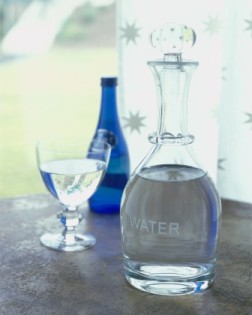Electrolyte Enhanced Water
Its Definition, Usage, and Benefits
by Nancy Hearn, CNC
Note: As an Amazon Associate I earn from qualifying purchases.
Electrolyte enhanced water is water that has electrically charged minerals, or electrolytes, added to it.
The most common electrolytes found in the body are sodium, potassium, chloride, phosphate, calcium, magnesium, and bicarbonate.
Proper hydration involves drinking enough water daily, along with maintaining a balance of electrolytes in the body.
According to the National Institutes of Health, electrolyte balance is critical for normal muscle and nerve function, as well as for maintaining the health of cells and organs.
In addition, electrolytes help to regulate fluid levels and the acid-alkaline balance in the body, both of which are essential to health and fitness.
When to Drink It?
Your body may lose electrolytes after a flu or illness involving excessive diarrhea or vomiting. This is the reason why if you’ve had the flu your doctor may recommend drinking a sports drink such as Gatorade or Powerade, which contain added electrolytes.
You can also lose too many electrolytes from excessive sweating and/or physical activity.
However, drinking plenty of filtered tap water (which contains minerals) will normally suffice to replenish electrolytes when exercising for less than an hour.
For high-intensity workouts or endurance-type activities lasting more than an hour, I recommend replenishing electrolytes both during and after exercise.
Also, exercising in hot temperatures can cause lower levels of electrolytes.
For more detailed information, see Proper Hydration Basics for Sports and Fitness.
Sports Drinks vs Electrolyte Enhanced Water
Even though most commercial sports drinks do contain added electrolytes, the big problem with them, from a nutritionist point of view, is that most of them also contain a ton of sugar and are highly acidifying in the body.
Sugar and acidic fluids are not going to help much if you are trying to recover from an illness. Neither will they improve sports performance or recovery.
Other products using terms such as "smart water" or "vitamin water" on their labels are considered electrolyte enhanced waters, but as far as I am concerned they are basically expensive sugar waters with a bit of salt added.
Then there’s the cost of commercial sports drinks and electrolyte enhanced waters. Considering this is a billion-dollar industry, I encourage you to take the time to really evaluate what you are drinking.
Most brands of sports drinks and enhanced waters cost $1 to $3 per quart bottle.
I guess some folks will continue to pay that for the sake of convenience. However, you can make your own electrolyte enhanced water in minutes for a few pennies. See recipe below.
In addition to the bottled electrolyte drinks, there are high-quality products available for professional athletes that come in the form of gels, tablets, and drops that can be added to filtered water before, during, and after workouts or events.
Some quality brands of electrolyte products include:
Nuun Hydration Tablets and Tubes
Trace Minerals Research Electrolytes
Serious endurance athletes, skiiers, snowboarders, and hikers may also want to consider a Camelbak Hydration Pack.
Homemade Electrolyte Drink
The following is a simple homemade electrolyte drink if you simply want to replenish electrolytes after an illness or strenuous physical activity lasting more than an hour, such as hiking, skiing, or working out at the gym.
This homemade version is less expensive than store-bought versions, is greener (no plastic bottles), and is healthier, too.
- Mix 16 ounces of filtered tap water or ionized water with 16 ounces of organic fruit juice (for potassium)
- Add one-fourth teaspoon of salt (for sodium)
- Optional: Add one-half teaspoon of honey (for glucose)
Further reading . . .
Return from Electrolyte Enhanced Water to Proper Hydration for Sports
If you would like to reproduce or republish this article or any other article on this site, feel free to do so but please include a reference or link to the article at WaterBenefitsHealth.com.
Sign Up for Our Monthly
Newsletter
Visitor Comments
"This was the best and most straight forward info on the net yet. I asked a question and got an answer that made sense. Thank you so much!" - Linderlinder
FINALLY!!! I have been wondering about this for years with no 'solid' answer. This is exactly what I've been wanting to know! Thank you for this share..." by Andy
"Thank you for the information, Nancy. I appreciate it. Your article and findings are very helpful, referring to dehydration." - Carolyn
"Lemon water is one drink both my wife and I can't drink. It upsets our stomachs. We are in our sixties and in very good health—well, better health now that we drink about 2 liters plus of water each day. It has made so much difference to our digestive systems and recovery every day. Thank you for your website and effort." - Rod



